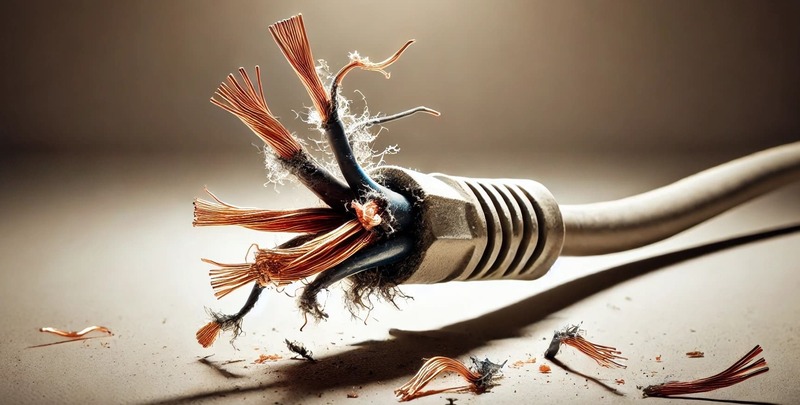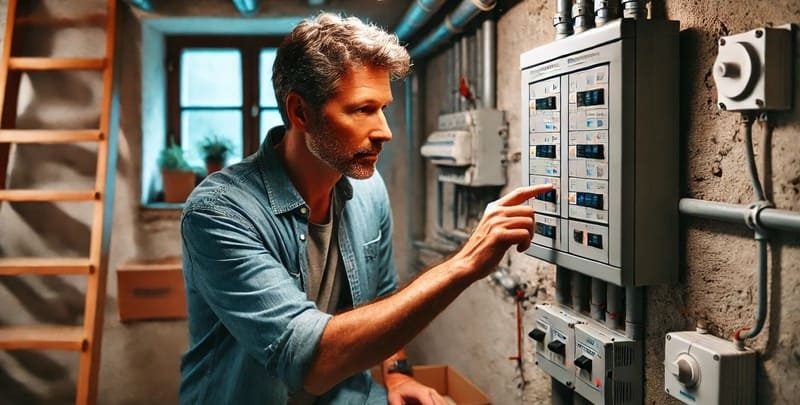The Dangers of Exposed Wires
The Dangers of Exposed Wires
Exposed wires in your home are more than just a visual nuisance—they’re a serious safety threat. Whether it's due to aging wiring, improper DIY work, or general wear and tear, exposed electrical lines can lead to dangerous situations that put your family and property at risk.
From electric shocks to fires, leaving wires uncovered can quickly turn into a major problem. Many people don’t realize how fast a small issue can escalate into something much worse. That’s why it’s important to address exposed wires as soon as you notice them.
Ignoring the problem could not only lead to accidents but also result in legal issues if local safety codes are violated. In this post, we’ll go over the real dangers of exposed wires, why they should never be ignored, and what you can do to protect your home and loved ones from these hidden risks.
Electrical Shocks and Burns
Exposing wires in your home is one of the most common causes of electrical shocks and burns. These hazards can happen in an instant, especially for children or pets who may not understand the danger.
Here are some key risks to watch out for:
- Direct contact: Touching an exposed wire can cause a painful or even fatal shock. This is especially risky for young kids and animals who might not recognize the danger.
- Burns from electricity: Electric current passing through the body can cause severe burns, which can be life-threatening and require immediate medical attention.
- Metals as conductors: Items like tools, jewelry, or appliances can easily come into contact with live wires, increasing the chance of electrocution.
- Hidden dangers: Wires behind furniture or inside walls can be hard to spot, making accidental contact more likely.
It’s crucial to take action right away when you see exposed wires. Ignoring them puts everyone in your home at risk.

Fire Hazards
One of the most dangerous consequences of exposed wires is the risk of fire. Damaged or frayed wires can spark, especially when they touch flammable materials like wood, fabric, or insulation.
These sparks can ignite nearby materials and start a fire that spreads quickly. In many cases, the wires are hidden behind walls or under floors, so the problem might go unnoticed until it's too late.
According to fire safety reports, faulty wiring is a leading cause of house fires. That’s why regular inspections and prompt repairs are essential, especially in older homes where electrical systems may have deteriorated over time.
If you suspect any issues with your wiring, don’t wait—contact a licensed electrician immediately to prevent a potential disaster.
Short Circuits and Equipment Damage
Exposed wires can cause short circuits, which can damage your electronics and increase your energy bills. A short circuit occurs when two wires touch, creating an unintended path for electricity to flow.
This can lead to overheating, tripped breakers, and even fires. It can also damage your appliances by sending surges of electricity through them, potentially ruining expensive devices like refrigerators, TVs, or computers.
In addition to equipment damage, short circuits can cause frequent breakdowns and higher utility costs. Fixing exposed wires early can help avoid these problems and keep your home running smoothly.
Increased Risk of Electrocution in Wet Areas
Exposed wires in wet areas like bathrooms, kitchens, or outdoor spaces are especially dangerous. Water conducts electricity very well, so even a small amount of moisture near a live wire can create a deadly situation.
A dripping faucet, a spilled drink, or a splash from a garden hose can all lead to a serious electric shock. This is why it's critical to fix any exposed wiring in these areas as soon as possible.
Installing Ground Fault Circuit Interrupters (GFCIs) in high-moisture zones adds extra protection, but the best solution is to repair the wiring itself. Always prioritize safety when dealing with electricity in damp environments.
Legal and Regulatory Issues
Beyond the physical dangers, exposed wires can also lead to legal trouble. Electrical codes are in place to ensure the safety of your home and its occupants. Failing to meet these standards can result in fines, insurance issues, or even liability if someone gets hurt.
If you're planning to sell your home, inspectors will flag exposed wiring, which could lower your home's value or delay the sale. For renters, landlords are legally responsible for maintaining safe conditions, and exposed wires can lead to disputes or legal action.
To stay compliant and avoid complications, always get professional help when dealing with electrical issues. It's better to invest in repairs now than face bigger problems later.

How to Handle Exposed Wires Safely
If you find exposed wires in your home, don’t try to fix them yourself. Here’s what you should do:
- Turn off the power: Locate your electrical panel and shut off the power to the affected area before doing anything else.
- Don’t touch the wires: Even if you think the power is off, never touch exposed wires with your bare hands.
- Keep others away: Make sure children and pets stay clear of the area until a professional arrives.
- Call a licensed electrician: Only a qualified professional should handle electrical repairs. They can safely assess and fix the issue.
- Use temporary covers: If needed, cover the wires with electrical tape until help arrives, but never attempt a permanent fix without expertise.
Taking these steps can help prevent injury and further damage while waiting for professional assistance.
Put Safety First – Protect Your Family
Exposed wires are not something to ignore. They pose real threats to your safety, your home, and your finances. From shocks and fires to legal issues, the consequences can be severe.
Regularly checking your home’s wiring and addressing any issues promptly can save you from costly repairs and prevent serious harm. If you ever encounter exposed wires, always act quickly and responsibly.
Never attempt DIY electrical fixes unless you're fully trained. When it comes to electricity, safety should always come first.
Please note: This information is for general guidance only. Regulations vary by location, so always consult local authorities or a qualified electrician before making any changes. See our Terms & Conditions for more details.
Brass Copper Bar,Alloy Brass Rod,Free Cutting Brass Rod,Free Cutting Brass
TAICANG CITY JINXN COPPER TUBE CO.,LTD , https://www.jinxincopperpipes.com